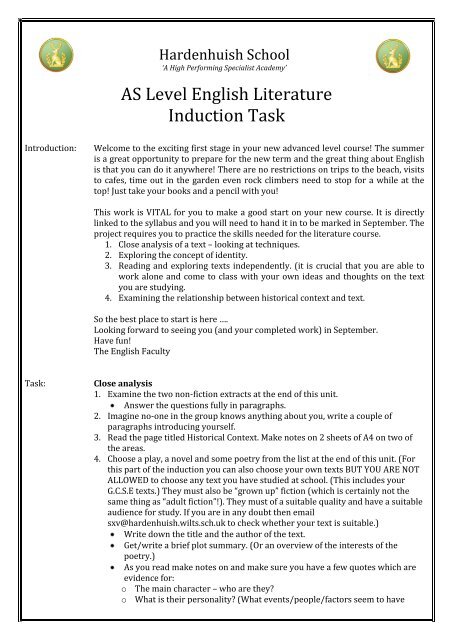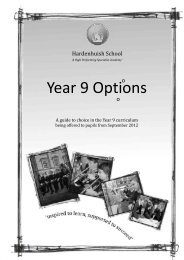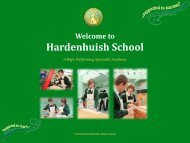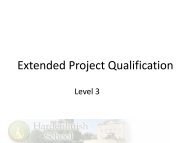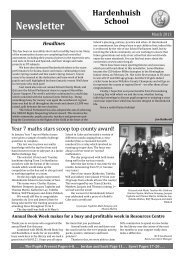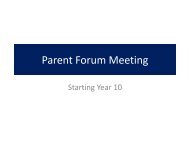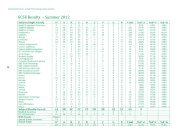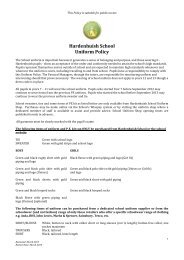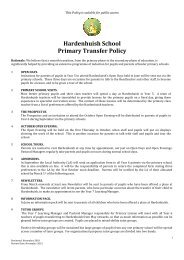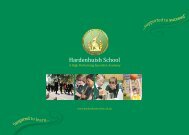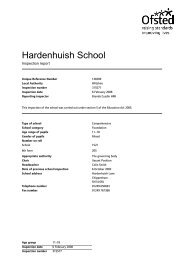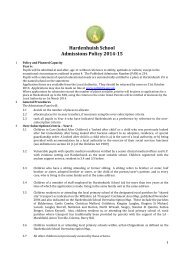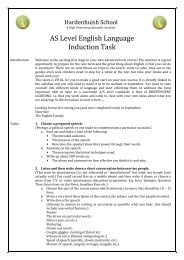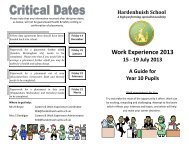AS Level English Literature Induction Task - Hardenhuish School
AS Level English Literature Induction Task - Hardenhuish School
AS Level English Literature Induction Task - Hardenhuish School
Create successful ePaper yourself
Turn your PDF publications into a flip-book with our unique Google optimized e-Paper software.
<strong>Hardenhuish</strong> <strong>School</strong><br />
‘A High Performing Specialist Academy’<br />
<strong>AS</strong> <strong>Level</strong> <strong>English</strong> <strong>Literature</strong><br />
<strong>Induction</strong> <strong>Task</strong><br />
Introduction:<br />
Welcome to the exciting first stage in your new advanced level course! The summer<br />
is a great opportunity to prepare for the new term and the great thing about <strong>English</strong><br />
is that you can do it anywhere! There are no restrictions on trips to the beach, visits<br />
to cafes, time out in the garden even rock climbers need to stop for a while at the<br />
top! Just take your books and a pencil with you!<br />
This work is VITAL for you to make a good start on your new course. It is directly<br />
linked to the syllabus and you will need to hand it in to be marked in September. The<br />
project requires you to practice the skills needed for the literature course.<br />
1. Close analysis of a text – looking at techniques.<br />
2. Exploring the concept of identity.<br />
3. Reading and exploring texts independently. (it is crucial that you are able to<br />
work alone and come to class with your own ideas and thoughts on the text<br />
you are studying.<br />
4. Examining the relationship between historical context and text.<br />
So the best place to start is here ….<br />
Looking forward to seeing you (and your completed work) in September.<br />
Have fun!<br />
The <strong>English</strong> Faculty<br />
<strong>Task</strong>:<br />
Close analysis<br />
1. Examine the two non-fiction extracts at the end of this unit.<br />
Answer the questions fully in paragraphs.<br />
2. Imagine no-one in the group knows anything about you, write a couple of<br />
paragraphs introducing yourself.<br />
3. Read the page titled Historical Context. Make notes on 2 sheets of A4 on two of<br />
the areas.<br />
4. Choose a play, a novel and some poetry from the list at the end of this unit. (For<br />
this part of the induction you can also choose your own texts BUT YOU ARE NOT<br />
ALLOWED to choose any text you have studied at school. (This includes your<br />
G.C.S.E texts.) They must also be “grown up” fiction (which is certainly not the<br />
same thing as “adult fiction”!). They must of a suitable quality and have a suitable<br />
audience for study. If you are in any doubt then email<br />
sxv@hardenhuish.wilts.sch.uk to check whether your text is suitable.)<br />
Write down the title and the author of the text.<br />
Get/write a brief plot summary. (Or an overview of the interests of the<br />
poetry.)<br />
As you read make notes on and make sure you have a few quotes which are<br />
evidence for:<br />
o The main character – who are they?<br />
o What is their personality? (What events/people/factors seem to have
influenced their character?)<br />
o What struggles/difficulties do they encounter through the text?<br />
o How do they deal with them? How does this reflect their personality?<br />
o Do they seem to you to be typical of their historical/social context? If so, in<br />
what ways? If not, why not?<br />
o Do they or any other character change significantly throughout the course<br />
of the text? Explain why.<br />
For each of your points for the above you need a quotation. In the quotation<br />
identify the “tool” or technique that the text uses.<br />
So for example you could say the reader learns this through the<br />
description/the use of adjectives,/the stage directions. Alternatively you<br />
might say this is reflected in the structure, the repetition of the phrase etc.<br />
Additional:<br />
Due:<br />
Set by:<br />
Expected Time<br />
Commitment:<br />
All resources are within this document<br />
Please bring to your first lesson in September<br />
If you have any queries regarding the task set please contact the Key Stage 5 coordinator<br />
sxv@hardenhuish.wilts.sch.uk and we’ll get back to you with an answer as<br />
soon as we can.<br />
10 hours
I have a dream – Martin Luther King.<br />
Martin Luther King was an American Civil Rights leader in the 1960s. In 1963, he led protests against<br />
discriminatory practices in Birmingham, Alabama where the white population was violently resisting<br />
desegregation. As attacks against civil rights protestors increased, the city was dubbed “Bombingham”<br />
and King was arrested and jailed for his part in the protests.<br />
After his release, King participated in the enormous civil rights march on Washington in August 1963<br />
and delivered his famous “I have a dream” speech, predicting a day when the promise of freedom and<br />
equality for all would become a reality in America.<br />
As we walk, we must make the pledge that we shall always march ahead. We cannot turn<br />
back. There are those who are asking devotees of civil rights, ‘When will you be satisfied?’ We<br />
can never be satisfied as long as the Negro is the victim of unspeakable horrors of police<br />
brutality. We can never be satisfied as long as our bodies, heavy with the fatigues of travel,<br />
cannot gain lodging in the motels of the highways and the hotels of the cities. We cannot gain<br />
lodging in the motels of the highways and the hotels of the cities. We cannot be satisfied as<br />
long as the Negro’s basic mobility is from a smaller ghetto to a larger one. We can never be<br />
satisfied as long as our children are stripped of their selfhood and robbed of their dignity by<br />
signs stating ‘For Whites Only’. We cannot be satisfied as long as a Negro in Mississippi cannot<br />
vote and a Negro in New York believes he has nothing for which to vote. No, no, we are<br />
satisfied; and we will not be satisfied until justice rolls down like waters and righteousness<br />
like a mighty stream.<br />
1. What is the form of this piece of writing?<br />
2. What is its purpose?<br />
3. Who does the audience seem to be?<br />
4. Summarise (in about two sentences) Luther King’s basic argument.<br />
5. What are the key points Luther King is making about a black people’s struggle for<br />
o identity?<br />
o Consider:<br />
o Patterns of imagery<br />
o Commands<br />
o How people are labelled<br />
o Form and structure<br />
o Dramatic and emotive language.<br />
o Repetition<br />
o Use of the first person.
Too Black, Too Strong – Benjamin Zephaniah<br />
Best known as a poet, though he has also written novels, plays, articles and music for both adults and<br />
children, Benjamin Zephaniah was brought up in the Handsworth district of Birmingham, England.<br />
Zephaniah left school at 14 and, after a few difficult teenage years, move to London in 1979 and<br />
published his first poetry collection, Pen Rhythm, in 1980. He explores many themes in his work but<br />
chief among them area issues of race and, in particular, Britishness. He employs a distinctive poetic<br />
style, drawing heavily on Jamaican patois and relishing the rhythms of rap and is a highly acclaimed<br />
performer of his own work as well as a social and political commentator.<br />
The following passage is taken from the introduction to one of Zephaniah’s collections of poetry,<br />
entitled Too Black, Too Strong and published in 2001.<br />
Britain is a wonderful place. It is a nation of shopkeepers, aristocrats, farmers and animal<br />
lovers, all at the same time. It has the 'mother of all parliaments', its inhabitants enjoy 'free<br />
speech' and the right to vote in open elections and it is so confident that it doesn't need a<br />
written constitution. Its cities are havens for the young, they pulsate to the music of the<br />
world, and though the skies may be grey for much of the year the streets are coloured by its<br />
people who now talk about 'raving' just as much as they talk about the weather. The cities<br />
'rock'. The same can be said for many of its towns, they may not have received the title of<br />
'city' from the Crown or be the 'seat of a bishop', but they still have the attitude and the<br />
rhythm of the city. Above all the capital city shines magnificent through its pollution, it is<br />
amongst the heavyweights of cities, here it is estimated that over three hundred languages<br />
are spoken. But Britain is not just a collection of cities. The quaint beauty of the 'Lake District'<br />
continues to inspire poets, and the grandeur of the Scottish mountains is famous all over the<br />
world. I have always admired the splendour of the Welsh Valleys, it seems to me this area<br />
represents both the picturesque and industrial side by side, for it is here that many of the<br />
nation's coalmines are to be found. In fact many of those coalmines were closed down in the<br />
1980's and they have now become tourist attractions, and a chosen few coal miners who<br />
were once doomed to a life of unemployment are now paid to show you what they used to do.<br />
The same fate has fallen upon coalmines all over Britain. But Britain is not just a collection of<br />
unused coalmines or museums, what of British culture?<br />
Well to date Britain has 21% of all major Oscars, 13% of television programmes shown at<br />
peak times worldwide are made in Britain, our pop music keeps conquering America,<br />
everyone knows of William Shakespeare and the Bronte Sisters, but what of the Teletubbies?<br />
Well they are one of the biggest single export products ever. All of the above represent an<br />
idea of Britain; we pick what we want to represent us depending on what type of 'subject' we<br />
are. The title of British means many things to many people, some choose to remain forever<br />
nostalgic for its 'days of former greatness' when Shakespeare was 'Top of The Pops' and the<br />
sun never set on the empire, whilst for others it's about the melting pot, bursting with vitality<br />
and smiling multiculturalism. The latter will tell you that it is the great British Indian curry<br />
that binds us together, these people are out to carve out a new idea of Britishness and feel<br />
hindered by those whose only purpose is to preserve the past. We are all imagining Britain,<br />
but that's a luxury, what's the reality?<br />
It is a place where African-Caribbean women make up 14% of the female prison population,<br />
whereas African-Caribbean people as a whole only make up 1.3% of the population of Britain.<br />
African-Caribbean and Asian people together make up 5.6% of the population but 16% of the<br />
prison population. Anybody who knows anything about Britain knows that you are five times<br />
more likely to be stopped and searched by the police if you are African-Caribbean, it also<br />
worth knowing that over 130,000 racist attacks happened in the Year 2000. These figures<br />
weren't given to me by friends and family, these are official figures, government figures, the
Commission for Racial Equality figures, and anybody who knows anything about official<br />
figures will also know they usually fall very short of the mark.<br />
Many of us Brits are easily deceived: even I used to believe that the country was becoming<br />
overcrowded and that the reason why so many Asians open corner shops is because they<br />
don't have the education to do anything else. The truth is that in the Year 2000, 11,000 more<br />
people left Britain than entered, over half the people given work permits were from 'The<br />
United States of America' and one out of every five Asian shopkeepers has a university<br />
degree, when asked almost every one of them said they opened up their own business<br />
because of racial discrimination by employers.<br />
What refugees? From being totally uninhabited Britain has constantly taken in new visitors<br />
be they Picts, Celts, Angles, Saxons, Chinese, Jamaicans, Jutes, Huguenots. All of them, with the<br />
possible exception of the Romans can be classed as refugees of one type or another. Some<br />
were fleeing religious persecution, others political persecution or racial persecution, some<br />
were even fleeing persecution from the weather e.g. hurricanes and floods, but we all came<br />
here from somewhere. So in theory Britain should be the last place on earth where you<br />
should find racism. But the reality is that many people are suffering from what I call the 'last<br />
of the boat syndrome'. They conveniently forget their journey here and now live in the fear<br />
that Britain will be flooded by penniless asylum seekers who would then drain our precious<br />
society of everything they hold dear. The reality is 30% of refugees have left professional jobs,<br />
10% held managerial positions and only around 5% are unskilled. The reality is that refugees<br />
built the National Health Service, refugees built our roads, they clean our cars, and when<br />
given the chance new refugees contribute disproportionately to the economy because they<br />
have seen hardship and suffering and view economic success as a way of repaying their<br />
country of refuge.<br />
Note down the key points Zephaniah is making here about the struggle for<br />
identity and comment on some of the ways he is expressing these points.<br />
You should consider:<br />
a. How the form and structure if the passage helps to contribute to the<br />
meaning. (So think about whether it reads like an essay, a rant or an<br />
argument and the organisation of the piece too.)<br />
b. The tone of the extract and comment on the language the writer uses and<br />
the references he makes.
Historical Context<br />
The A/S course focuses on texts written between 1900 and the present day.<br />
The main areas which relate to our study are:<br />
Class<br />
Politics<br />
Gender - Homosexuality & Women<br />
Race<br />
Religion<br />
We need to have an overview of how the representation, view and treatment of these different<br />
groups/ideas in society has changed since 1900. Clearly in 1910 the idea of having a female or black<br />
President in the U.S. was clearly unthinkable. Likewise the concepts of multi-culturalism or gay rights are<br />
equally novel.<br />
Obviously whole books have been written on all of these …. but for each area we only need about a side of<br />
A4 in note form which should give an overview of/a sense of the situation in the past and now. (The<br />
purpose of this is for you to think about important issues and concepts which are fundamental to the<br />
course. )<br />
Consider:<br />
A sense of trends/changes<br />
Any key moments. (e.g. when the treatment of a particular group changed as when women got the<br />
vote or when homosexuality was de-criminalised).<br />
Any texts (novels, plays, films etc) which deal with the subject. e.g. My Fair Lady is concerned with<br />
class division.<br />
Choose 2 of the areas to research and prepare some notes on. Use the questions as a starting point but<br />
don’t feel restricted or contained by them.<br />
Gender – Women.<br />
1. In the early part of the twentieth century –<br />
what was the status of women? How were<br />
they treated by men, their families, the rest of<br />
society?<br />
2. What were the “battles” have women fought<br />
over the last century? What, in general terms<br />
was their purpose? What were their goals?<br />
3. Consider your perception of the current<br />
situation? How have attitudes to women<br />
changed? How do women think about<br />
themselves? Does society treat women and<br />
men differently?<br />
Homosexuality<br />
1. In 1900 how, in general terms, was<br />
homosexuality treated by society? Give<br />
examples of evidence to prove your views.<br />
2. When did homosexuality between men stop<br />
being a criminal offence?<br />
3. What “battles” have supporters of<br />
homosexuality fought? What means have they<br />
used to try and raise awareness of their<br />
cause?<br />
4. What is your perception of the current<br />
situation? How is homosexuality treated by<br />
society generally or particular sections of<br />
society? Is there a difference in attitude<br />
towards male and female homosexuality?<br />
Class<br />
1. What does the term class mean?<br />
2. How would you roughly divide British society<br />
in class terms?<br />
3. How would you stereotypically identify the<br />
different classes?<br />
4. What advantages does the upper class have?<br />
5. In 1900, how was the importance of class<br />
different to how it is now? In what ways was<br />
this evident?<br />
Religion<br />
1. In 1900 what was the predominant religion in<br />
the U.K?<br />
2. How important was religion to the individual<br />
at the turn of the century? How could you<br />
prove this?<br />
3. How has the “religious profile” of the U.K.<br />
changed over the last century?<br />
4. What national and international conflicts<br />
have had a religious element to them?<br />
5. What ideological conflicts has the Church of<br />
England undergone over the last century? E.g<br />
female vicars etc.<br />
6. What do you consider are the religious issues<br />
of our time?
Text List - The Struggle for Identity in Modern <strong>Literature</strong><br />
(* denotes text published after 1990)<br />
(+ denotes text published between 1800-1945)<br />
PROSE FICTION<br />
Any of the ten named prose texts for Unit 2, or any other novel by Morrison.<br />
Chinua Achebe Things Fall Apart (Penguin, 1958)<br />
James Baldwin<br />
Go Tell it on the Mountain (Penguin)<br />
Nadine Gordimer July’s People (Bloomsbury, 1981)<br />
Radclyffe Hall The Well of Loneliness + (Virago, 1928)<br />
Zora Neale Hurston Their Eyes Were Watching God + (Virago, 1937)<br />
Andrea Levy Small Island * (Headline, 2004)<br />
Patrick McCabe Breakfast on Pluto * (Picador, 1998)<br />
Anne Michaels Fugitive Pieces * (Bloomsbury, 1996)<br />
Arundhati Roy The God of Small Things * (Harper Perennial, 1997)<br />
Robert Tressell The Ragged-Trousered Philanthropists + (Flamingo, 1914)<br />
Irvine Welsh Trainspotting * (Vintage, 1993)<br />
Jeanette Winterson Oranges are not the only fruit (Vintage, 1984)<br />
Richard Wright Native Son + (Vintage, 1940)<br />
Kurt Vonnegut Slaughterhouse 5 (Vintage, 1969)<br />
Rose Tremain<br />
The Road Home (Chatto and Windus)<br />
Kathryn Stockett The Help (Penguin, 2009)<br />
PROSE NON-FICTION<br />
Autobiographies and Biography, Diaries<br />
Maya Angelou Autobiography, especially I Know Why The Caged Bird Sings (Virago, 1969)<br />
Diana Souhami The Trials of Radclyffe Hall * (Virago, 1999)<br />
Nelson Mandela Long Walk to Freedom (Abacus, 1994)<br />
Memoirs and Interviews<br />
Silvia Calamati Women’s stories from the North of Ireland * (Beyond the Pale Publications, 2002)<br />
Bobby Sands Skylark Sing Your Lonely Song (Mercier Press, 1982)<br />
Malcolm X Malcolm X Talks to Young People (Pathfinder, 1964-1965)<br />
Alice Walker The Same River Twice: Honoring the Difficult * (Phoenix, 1996)<br />
Travelogues<br />
Salman Rushdie The Jaguar Smile: A Nicaraguan Journey (Vintage, 1987)<br />
History and cultural commentary, essays and speeches<br />
David Beresford<br />
Ten Men Dead: The Story of the 1981 Irish Hunger Strike (Harper Collins,1987)<br />
Beverley Bryan, Suzanne Scafe, The Heart of the Race (Virago, 1985)<br />
Stella Dadzie<br />
Germaine Greer The Female Eunuch (Harper Perennial, 1970)<br />
Martin Luther King Jr. I Have A Dream: Writings And Speeches That Changed The World (Harper, 1956-68)<br />
Adhaf Soueif Mezzaterra-Fragments from the Common Ground * (Bloomsbury, 2004)<br />
Amrit Wilson Dreams, Questions, Struggles South Asian Women in Britain (Pluto Press, 2006)<br />
Laws<br />
Parliament ‘Section 28 of the Education Act’ 1988<br />
Literary Criticism<br />
Ralph Ellison Shadow and Act (Vintage, 1967)<br />
Dolly A. McPherson Order out of Chaos: The Autobiographical Works of Maya Angelou (Virago, 1990)<br />
Kate Millet Sexual Politics (Virago, 1977)<br />
Amrit Wilson Finding a Voice: Asian Women in Britain (Virago, 1978)<br />
Richard Wright Blueprint for Negro Writing + (1937)<br />
Jeremy Hawthorn ed. The British Working Class Novel in the Twentieth Century (Hodder Arnold, 1984)<br />
DRAMA<br />
Brendan Behan The Hostage (Methuen, 1958)<br />
Sudhar Bhuchar<br />
Child of the Divide * (Methuen Modern Plays)
Jim Cartwright Road (Methuen Modern Plays, 1986)<br />
Caryl Churchill All plays * (some will be post 1990)<br />
Claire Dowie Why is John Lennon Wearing a Skirt? * (Methuen Modern Plays, 1996)<br />
Brian Friel Dancing at Lughnasa * (Faber, 1990)<br />
Lorraine Hansberry A Raisin in the Sun (Methuen Modern Plays, 1959)<br />
Sarah Kane Complete Plays * (Methuen Drama, 1998-2006)<br />
Tony Kushner Angels in America * (Nick Herne Books, 1992)<br />
Martin McDonagh Beauty Queen of Leenane * (Methuen, 1996)<br />
Sean O’Casey<br />
Three Dublin Plays: Juno and the Paycock + (1924), The Plough and the<br />
Arthur Miller<br />
Stars + (1926), Shadow of a Gunman + (1923) (Faber)<br />
Mark Ravenhill Death of a Salesman (Penguin, 1949)<br />
Ntozake Shange Citizenship * (Methuen Modern Plays, 2006)<br />
Timberlake Wertenbaker<br />
Shange Plays 1- (Includes For Colored Girls Who Have Considered Suicide When the<br />
Rainbow is Enough)<br />
Tennessee Williams Our Country’s Good (Methuen, 1988)<br />
A Streetcar Named Desire (Methuen, 1947)<br />
International Connections New Plays for Young People * (Faber 2003)<br />
(contributor Jackie Kay)<br />
POETRY<br />
Simon Armitage<br />
W.H Auden<br />
Gillian Clarke<br />
Carol Ann Duffy<br />
Allan Ginsberg<br />
Langston Hughes<br />
Jackie Kay<br />
Liz Lockhead<br />
Audre Lorde<br />
Grace Nichols<br />
Adrienne Rich<br />
Lemn Sissay<br />
Gertrude Stein<br />
Alice Walker<br />
Benjamin Zephaniah<br />
Edited by Lemn Sissay<br />
Agnes Meadows<br />
Gillian Clarke<br />
Alice Oswald<br />
Grace Nichols<br />
Carol Ann Duffy<br />
Jackie Kay<br />
Liz Lochhead<br />
Lenin Sissay<br />
Dead Sea Poems * (Faber, 1995)<br />
e.g ‘The Quarry’, ‘Funeral Blues’, ‘Refugee Blues’ + (1930s)<br />
Letter From a Far Country (1985)<br />
The Other Country * (Anvil, 1990)<br />
Howl (City Lights Pocket Poet Series, 1956)<br />
Collected Poems + (Vintage, 1930-1960)<br />
Life Mask * (Bloodaxe Books, 2005)<br />
Dreaming Frankenstein and Collected Poems (Polygon, 1984)<br />
Any – (some will be post 1990)<br />
The Fat Black Woman’s Poems (Virago, 1984)<br />
The <strong>School</strong> Among the Ruins * (Norton, 2004)<br />
Morning Breaks in the Elevator * (Payback Press, 1999)<br />
Tender Buttons + (Dover, 1914)<br />
Revolutionary Petunias and other Poems (Harcourt Brae Jovanovitch, 1970)<br />
Too Black, Too Strong * (Bloodaxe Books, 2001)<br />
The Fire People: A Collection of Contemporary Black British Poets * (Payback Press, 1998)<br />
Woman (Waterways, 2003)<br />
A Recipe for Water (Carcaret, 2009)<br />
The Thing in the Gap Stone Stile (Faber, 1996)<br />
I Have Crossed an Ocean (Bloodaxe Books Ltd, 2010)<br />
Love Poems (Picador, 2010)<br />
Darling (Bloodaxe Books Ltd, 2007)<br />
The Colour of Black and White (Polyfon, 2003)<br />
Rebel Without Applause (Bloodaxe Books Ltd, 1992<br />
TEXTS IN TRANSLATION<br />
Novels<br />
Isabel Allende The House of the Spirits (Chile/Spanish) (Black Swan, 1985)<br />
Alexandra Kollontai Love of Worker Bees + (USSR/Russian) (Virago, 1930)<br />
Manuel Puig Kiss of the Spider Woman (Argentina/Spanish) (Vintage, 1976)<br />
Alexander Solzenichen One Day in the Life of Ivan Denisovitch (USSR/Russian) (Penguin, 1962)<br />
Poetry<br />
Pablo Neruda Residence on Earth + (Chile/Spanish) (Souvenir Press, 1933)<br />
Drama<br />
Bertolt Brecht Mother Courage and her Children + (German) (Methuen, 1940)<br />
Federico Garcia Lorca<br />
The House of Bernarda Alba + (1936), Yerma + (1934), Blood Wedding + (1933) (Spanish)<br />
(Penguin)<br />
Non fiction autobiography/diary/travelogue<br />
Anne Frank The Diary of a Young Girl (Dutch) (Penguin, 1947)<br />
Che Guevara The Motorcycle Diaries (Argentina/Spanish) (Harper Perennial, 1952)<br />
Nawal al-Saadawi Memoirs from the Women’s Prison (Egypt/Arabic) (1984)


